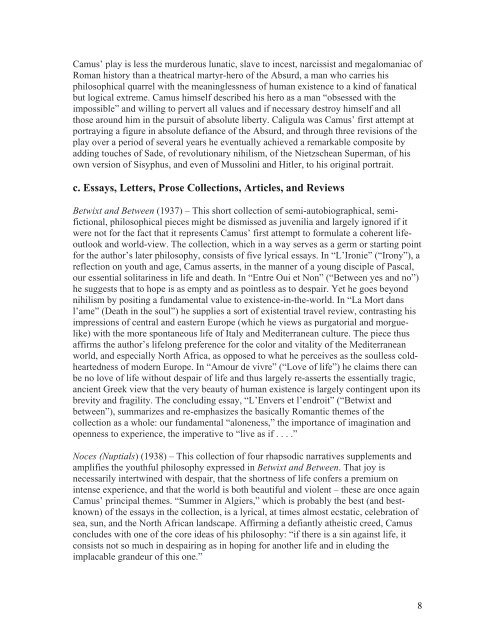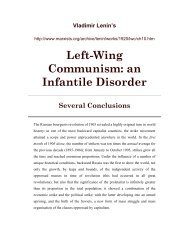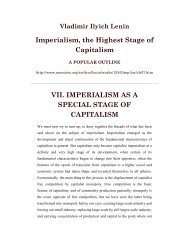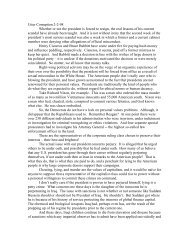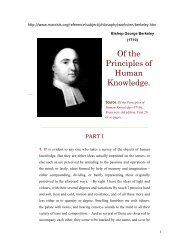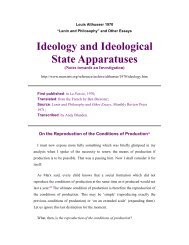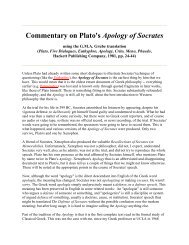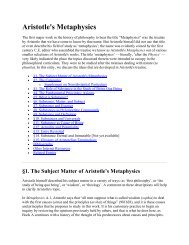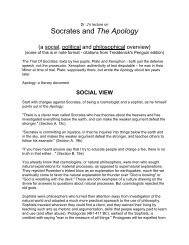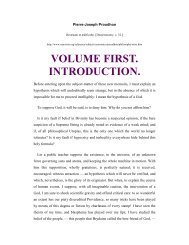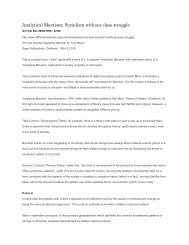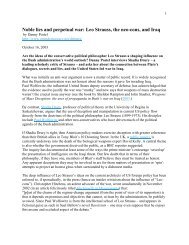Albert Camus (1913â1960) - Richard Curtis
Albert Camus (1913â1960) - Richard Curtis
Albert Camus (1913â1960) - Richard Curtis
Create successful ePaper yourself
Turn your PDF publications into a flip-book with our unique Google optimized e-Paper software.
<strong>Camus</strong>’ play is less the murderous lunatic, slave to incest, narcissist and megalomaniac of<br />
Roman history than a theatrical martyr-hero of the Absurd, a man who carries his<br />
philosophical quarrel with the meaninglessness of human existence to a kind of fanatical<br />
but logical extreme. <strong>Camus</strong> himself described his hero as a man “obsessed with the<br />
impossible” and willing to pervert all values and if necessary destroy himself and all<br />
those around him in the pursuit of absolute liberty. Caligula was <strong>Camus</strong>’ first attempt at<br />
portraying a figure in absolute defiance of the Absurd, and through three revisions of the<br />
play over a period of several years he eventually achieved a remarkable composite by<br />
adding touches of Sade, of revolutionary nihilism, of the Nietzschean Superman, of his<br />
own version of Sisyphus, and even of Mussolini and Hitler, to his original portrait.<br />
c. Essays, Letters, Prose Collections, Articles, and Reviews<br />
Betwixt and Between (1937) – This short collection of semi-autobiographical, semifictional,<br />
philosophical pieces might be dismissed as juvenilia and largely ignored if it<br />
were not for the fact that it represents <strong>Camus</strong>’ first attempt to formulate a coherent lifeoutlook<br />
and world-view. The collection, which in a way serves as a germ or starting point<br />
for the author’s later philosophy, consists of five lyrical essays. In “L’Ironie” (“Irony”), a<br />
reflection on youth and age, <strong>Camus</strong> asserts, in the manner of a young disciple of Pascal,<br />
our essential solitariness in life and death. In “Entre Oui et Non” (“Between yes and no”)<br />
he suggests that to hope is as empty and as pointless as to despair. Yet he goes beyond<br />
nihilism by positing a fundamental value to existence-in-the-world. In “La Mort dans<br />
l’ame” (Death in the soul”) he supplies a sort of existential travel review, contrasting his<br />
impressions of central and eastern Europe (which he views as purgatorial and morguelike)<br />
with the more spontaneous life of Italy and Mediterranean culture. The piece thus<br />
affirms the author’s lifelong preference for the color and vitality of the Mediterranean<br />
world, and especially North Africa, as opposed to what he perceives as the soulless coldheartedness<br />
of modern Europe. In “Amour de vivre” (“Love of life”) he claims there can<br />
be no love of life without despair of life and thus largely re-asserts the essentially tragic,<br />
ancient Greek view that the very beauty of human existence is largely contingent upon its<br />
brevity and fragility. The concluding essay, “L’Envers et l’endroit” (“Betwixt and<br />
between”), summarizes and re-emphasizes the basically Romantic themes of the<br />
collection as a whole: our fundamental “aloneness,” the importance of imagination and<br />
openness to experience, the imperative to “live as if . . . .”<br />
Noces (Nuptials) (1938) – This collection of four rhapsodic narratives supplements and<br />
amplifies the youthful philosophy expressed in Betwixt and Between. That joy is<br />
necessarily intertwined with despair, that the shortness of life confers a premium on<br />
intense experience, and that the world is both beautiful and violent – these are once again<br />
<strong>Camus</strong>’ principal themes. “Summer in Algiers,” which is probably the best (and bestknown)<br />
of the essays in the collection, is a lyrical, at times almost ecstatic, celebration of<br />
sea, sun, and the North African landscape. Affirming a defiantly atheistic creed, <strong>Camus</strong><br />
concludes with one of the core ideas of his philosophy: “if there is a sin against life, it<br />
consists not so much in despairing as in hoping for another life and in eluding the<br />
implacable grandeur of this one.”<br />
8


